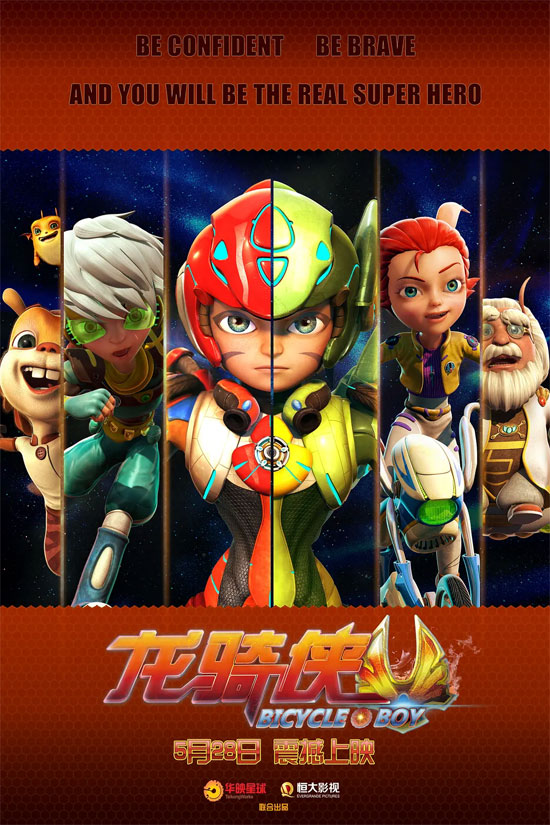Film Name: 龙骑侠 / Bicycle Boy

Like the earlier “AniMen,” the film “Bicycle Boy” adapts a TV series into a theatrical release, making it prone to feeling rushed or incomplete. Reportedly, the script was still being revised during post-production in November for its January 1st release—a testament to the director’s dedication on one hand, yet revealing a lack of professionalism in overall planning on the other.
In truth, Guo Guo’s profession as a flower delivery boy is both creative and romantic. Unfortunately, the film fails to delve deeply into why he must be a flower delivery boy. On the surface, delivering flowers honed the protagonist’s exceptional cycling skills, giving him the potential to become a “cycling knight.” On a deeper level, delivering flowers is about bringing happiness to people’s lives. Guo Guo must first be someone who loves flowers (and life) to properly protect and deliver them. Regrettably, the film completely neglects these layers.
The movie portrays Guoguo as a “cynical” individual but fails to explain why such a person would suddenly become earnest, compassionate, and responsible when faced with matters of great importance. It seems as though he “just happened” to become the Dragon Knight, automatically achieving a sudden leap in his ideological development—a highly irresponsible simplification. The film aims to explain his transformation, yet deliberately avoids doing so. The Dragon Knight’s first transformation in the alternate dimension and his final gear upgrade are undeniably cool, but these deliver only superficial visual thrills. What truly moves the heart is absent.
What truly moves us? Take the grandfather’s death, for instance. How should he have died? He must have been portrayed as stern and cold-hearted. For such a man to ultimately shield his granddaughter—whom he likely scolded constantly—from enemy attacks would be profoundly moving. It would reveal the stark contrast between his icy exterior and warm heart, evoking genuine affection. The film offers no psychological or emotional build-up for the grandfather—perhaps present in the TV animation but “forgotten” in the feature film—so his sudden sacrifice feels hollow, his death as weightless as a feather. Worse still, he inexplicably resurrects at the end, making his earlier death seem like a pointless joke, devoid even of a feather’s worth of significance.
What truly stirs the heart? Take the scene where not a single child in the valley can be left behind. This was a brilliant plot device—the old man’s dying wish to ensure every child was accounted for—setting up a gripping dramatic tension. What if one child went missing? When this situation actually unfolds in the film, I was genuinely gripped, thinking: This carries the weight of the deceased’s final wish! The protagonists must fight to the death to find or rescue the missing child. Yet the film’s resolution left me utterly dumbfounded: Guoguo simply rides his bike to fetch the child who’d been left behind in a house, and that’s it. Such a weightless plot development utterly fails to build audience empathy for these characters upholding the dying man’s trust.
What truly moves the heart? Take the removal of the poisoned arrow, for instance. Guoguo is struck by a poisoned arrow, and Miao Miao—the Dragon Knight cadet instructor who had always looked down on him—saves him. What should Miao Miao do at this moment? She should believe Guoguo is dying, instantly recall every moment they shared, and risk her life to extract the poison—even knowing she will inevitably be poisoned herself. It’s only when facing the loss of someone that one realizes their preciousness and seeks to make amends, even at the cost of self-sacrifice—this is profoundly moving. Yet how did the film handle it? They carried Guoguo to another dimension, where the poisoned arrow vanished naturally, leaving Guoguo perfectly unharmed. Miao Miao remarked, “So the poisoned arrow disappears once we get here!” If all movies were made this way, it would truly test the audience’s intelligence and emotional intelligence—not how high they are, but how low they can sink.
The current Guoguo is not only unfit for the flower-delivery profession but also unworthy of the Dragon Knight’s heroic title. He should perceive all the beauty in life and channel it into the motivation to protect and deliver flowers. His ultimate victory over the Dark Commander would never come from upgraded gear, but from the strength he gains from everyone’s care for him, and from his own love for the world, for life, and for every person. That is the true Dragon Knight!
PS: The film severely underdeveloped the human-pet dynamic. One pet character was completely sidelined and lacked any endearing qualities.
PS2: The portrayal of Guoguo’s family relationships was simplistic and heavy-handed. How could someone who finds no warmth within their own family possibly love the world?
Please specify:Anime Phone Cases » Bicycle Boy 2015 Animation Film Review: What kind of flower delivery boy do we need?